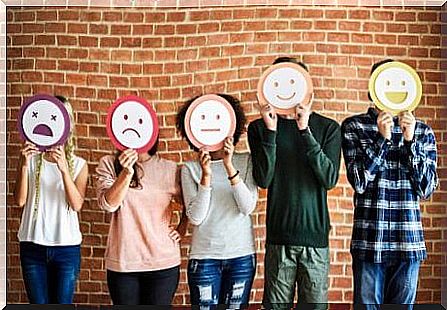Sociometer Theory: How Important Are Other People’s Opinions About You?

How much do you attach importance to the opinions of others? We usually tend to underestimate how important the opinions of others are to us. While it may seem unbelievable, it is actually likely that we have a mechanism that helps us adapt our behavior to this information. To dig deeper into the subject, we will today talk about the sociometer theory.
This theory speaks of a psychological mechanism that helps you minimize the risk of being rejected. In the same way, it is also closely linked to self-control while we are in the company of others.
This regulatory mechanism seems to respond to changes in relational values. It provides a framework for analyzing phenomena such as self-esteem and sensitivity to rejection. It can also help us understand personality disorders and many of the reactions others have towards us.
This psychological indicator can even provide valuable information about what happens when people exercise self-control in a dysfunctional way. This form of self-control can damage their relationships with other people.
The evolutionary basis of sociometer theory
Baumeister and Leary developed the sociometer theory of self-esteem. Gardner, Pickett, and Brewer then expanded it, and they based their research on the idea that humans are virtually incapable of surviving and reproducing without social relationships.
Therefore, people developed a system that allows them to maintain these relationships. To do that, the system needed to monitor the reactions of others to one’s behavior. More specifically, it needed to monitor the reactions of others to one’s actions that could lead to social exclusion.
This monitoring system warns the individual about possible changes in their inclusion status or decreases in social acceptance. In other words, this relationship status scanner is what motivates you to act in a certain way to repair harmful situations in your relationships.
In the same way, it also warns you of behaviors that can put your social ties at risk. In short, people have developed social mechanisms that monitor the person’s indirect visual environment, searching for clues that are relevant to the relationship value of the person in their environment.

Emotions: measuring instrument
According to sociometer theory, self-esteem is an indicator of the quality of social relationships. When people behave in a certain way that leads to rejection, their self-esteem will suffer. If, on the other hand, they maintain behaviors that consist of positive emotions, their self-esteem will increase. Therefore, it can be said that self-esteem is an important emotional component.
Nature has given us an alarm system that signals things it wants us to avoid through pain. In the same way, they signal things that we should continue to do with pleasure. When a person’s needs are not met, an unpleasant feeling can appear to make the body react and repair the situation that is unpleasant or threatening.
In a similar way , emotions are used to warn you of events that may threaten your well-being.

How does this surveillance system work?
This surveillance system acts subconsciously. It does so until it detects that the relational value is low or declining. At that moment, it forces the individual to consciously consider the situation. If a person has recently experienced rejection, he or she will be sensitive to what other people think of her. If so, she will devote more cognitive resources to thinking about her social status.
This theory says that self-esteem is an indicator and that it is therefore logical to act in line with it. Pablo Malo – psychiatrist – compared this phenomenon to a car’s fuel gauge:
This leads us to believe that we can strengthen our self-esteem by gaining social and adaptive skills. From this point of view, the way we adapt to the circumstances and how we value this adaptation seem to significantly influence our self-esteem.









